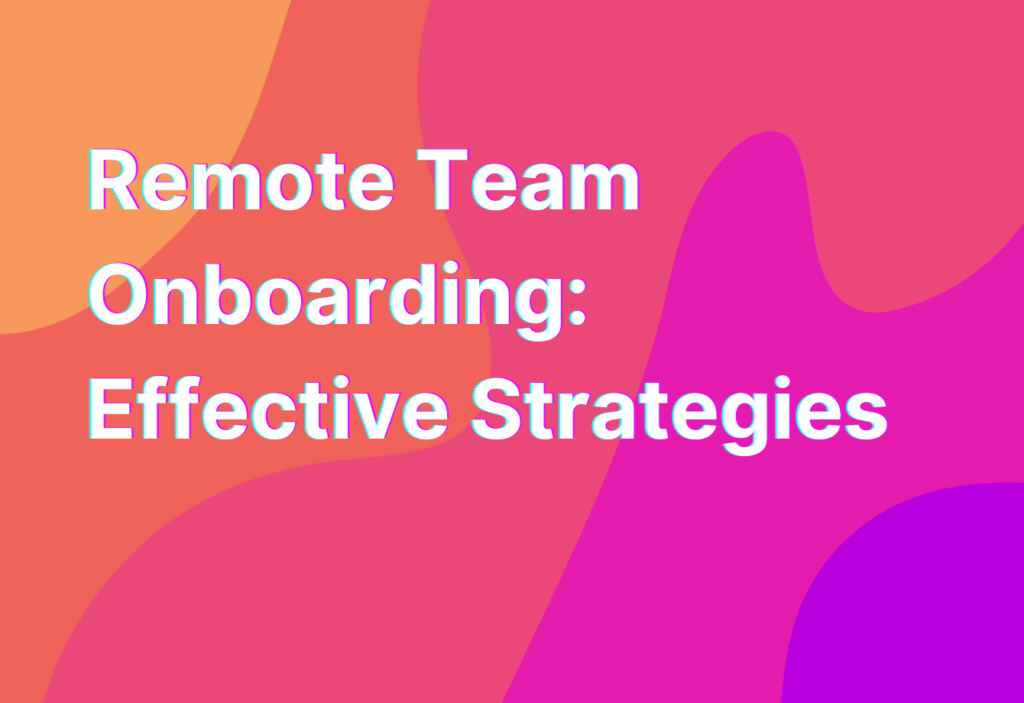Remote Team Onboarding: Effective Strategies
Welcome back, remote work enthusiasts! Today, we’re diving into the exciting world of remote team onboarding. As someone who has been working remotely for over 10 years, I’ve seen firsthand the importance of a smooth onboarding process for new team members. So, whether you’re a remote work veteran or just starting out, buckle up and get ready to learn some effective strategies for onboarding your remote team!
The Importance of a Strong Onboarding Process
Before we jump into the strategies, let’s take a moment to understand why a strong onboarding process is crucial for remote teams. When new team members join your remote team, they need to feel welcomed, supported, and equipped with the necessary tools and information to hit the ground running. A well-designed onboarding process sets the stage for success and helps new hires integrate seamlessly into your remote work culture.
Now that we’ve established the importance of onboarding, let’s explore some effective strategies to make the process a breeze:
1. Create a Detailed Onboarding Plan
Having a well-structured onboarding plan is key to ensuring a smooth transition for new team members. Outline the steps and milestones they need to complete during their first week, month, and beyond. This plan should include introductions to key team members, training sessions, and any necessary paperwork or documentation.
Remember, remote onboarding is different from traditional onboarding, so be sure to include specific instructions on how to set up their remote workspace, access company resources, and communicate with the team.
2. Foster a Sense of Belonging
Remote work can sometimes feel isolating, especially for new team members who haven’t had the chance to build relationships with their colleagues. To combat this, make it a priority to foster a sense of belonging from day one.
Encourage new hires to introduce themselves to the team, either through a dedicated channel on your communication platform or during a virtual team meeting. Consider assigning them a buddy or mentor who can provide guidance and support during their onboarding journey.
3. Provide Clear Communication Channels
Effective communication is the lifeblood of remote teams. Make sure new team members have access to all the necessary communication tools and platforms. Whether it’s Slack, Microsoft Teams, or Trello, ensure they know how to use these tools and understand the team’s communication norms.
Additionally, establish regular check-ins with new hires to address any questions or concerns they may have. This will help them feel supported and connected to the team.
4. Offer Comprehensive Training
Remote work often requires specific skills and knowledge. To set your new team members up for success, provide comprehensive training that covers both the technical aspects of their role and the remote work best practices.
Consider creating video tutorials, hosting webinars, or providing access to online courses that can help them develop the necessary skills. Don’t forget to include resources and documentation they can refer back to as needed.
5. Continuously Evaluate and Improve
Once your new team members have completed their onboarding process, it’s important to continuously evaluate and improve your onboarding strategies. Solicit feedback from new hires to identify areas for improvement and make adjustments accordingly.
Regularly assess the effectiveness of your onboarding process by tracking key metrics such as time to productivity, employee satisfaction, and retention rates. This will help you refine your strategies and ensure a seamless onboarding experience for future hires.
Wrapping Up
And there you have it, folks! A comprehensive guide to effective remote team onboarding. By following these strategies, you’ll be well on your way to creating a welcoming and supportive environment for your new remote team members.
Remember, onboarding is just the beginning. To ensure the long-term success of your remote team, be sure to check out our article on Performance Evaluation and Communication Strategies. It’s packed with valuable insights and tips to help you optimize your remote team’s performance.
Until next time, happy onboarding!


